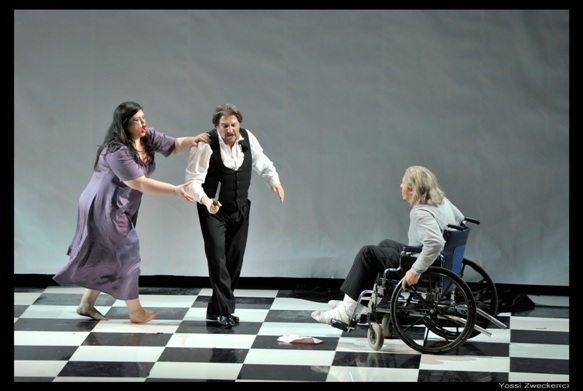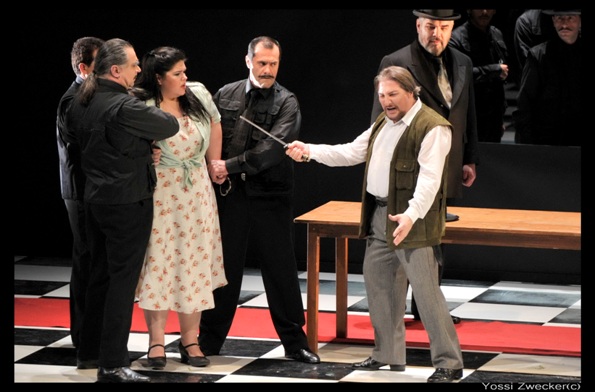This year, like many opera companies across the globe, the Israel Opera will mark two centuries since the birth of composer Giuseppe Verdi (1813-1901). Performed for kings and for commoners, sung in concert halls and in gondolas, and beloved by millions around the world, his operas have become standard repertoire, his music instantly recognizable. Three of the twenty-eight operas Verdi composed will be performed this season at the Israel Opera, beginning with Luisa Miller (1849).

The eponymous Luisa is a young girl living in a Tyrolean village with her father, a retired (and in this production, injured) soldier. Her simple, honest life is shattered when she is confronted with the corruption and cruelty of the upper class. Themes of class structure and its effect on the individual are not uncommon in the plots of Verdi’s operas, and though his celebrity in Italy was indisputable, Verdi saw himself as a simple villager, a paesano – perhaps not unlike Luisa.
Luisa Miller characterizes the beginning of Verdi’s middle period, that turning point in his career where the bel canto influences are still vividly heard, but the composer’s own musical style is already blooming. Verdi aficionados who are not familiar with this rarely-performed work will doubtlessly enjoy the wonderful arias and ensembles and the meticulous orchestration that supports and illustrates each vocal part. The story will sound familiar to some, and many of the themes and character relationships Verdi’s operas depict are also explored in Luisa Miller.
The libretto was written by Verdi’s previous collaborator Salvadore Cammarano and based on Schiller’s play Kabale und Liebe (Intrigue and Love). Verdi had written operas based on Schiller before – I masnadieri and Giovanna d’Arco – and would go on to compose another, Don Carlo. Luisa Miller was written at a period when Verdi, disappointed by the failure of the Italian uprisings revolutions of 1848, turned away from the patriotic and nationalistic themes of his previous opera, La battaglia di Legnano, and focused instead on “intimate” operas that also criticize class society: Luisa Miller, Rigoletto, and La Traviata.
The opera is written in three acts, each bearing a title: “Love”, “Intrigue”, and “Poison”. Act I opens on the morning of Luisa’s birthday. She is in love with Carlo, whom she thinks is a simple hunter but is in fact Rodrigo, son of the tyrannical Count Walter (who murdered his cousin and usurped his throne). The deception is revealed to Luisa’s father by Wurm (German for “snake”), the Count’s steward, who is also in love with Luisa. Count Walter wants his son to marry Duchess Federica, and sends his henchmen to arrest Luisa and her father. Rodolfo manages to protect his beloved by threatening to reveal the truth behind the Count’s rise to power.
However, old Miller is arrested, and in Act II Wurm arrives to tell Luisa that the only way to save her father is to write a letter claiming she was only after Rodolfo for his position and wealth, and that she actually loves Wurm. Desperate to save her father, Luisa consents. Walter gives his son the letter, and Rodolfo, convinced that Luisa has betrayed him, agrees to marry the Duchess.
In Act III, Rodolfo arrives in the village and confronts Luisa. When she is unable to tell him that the letter was false, he poisons her and himself. Upon learning that she is about to die, Luisa reveals the truth. In a final ensemble, with all the main characters onstage, Luisa bids goodbye to her father and dies, and Rodolfo, with his last breath, stabs Wurm.

What makes this production absolutely delectable is the singing. Both casts feature young singers that will without a doubt become household names. The star of the show is Leah Crocetto, an American soprano who controls her incredible voice perfectly and makes singing the difficult dramatic coloratura role seem easy. She conquers the Act I coloratura aria, “Lo vidi, e’l primo palpito”, and in Act II launches fearlessly into the cabaletta “A brani, a brani, o perfido”, vividly portraying Luisa’s anger at Wurm.
Vitaliy Bilyy’s Miller is world-class. From the wheelchair to which his character is confined, he delivers the notoriously-tough Verdi baritone role with grace and top-notch acting. Massimiliano Pisapia’s vocal ability and acting skills produce a magnificent Rodolfo, another difficult, high-tessitura role which Pisapia shares with South Korean tenor Francesco Hong, a singer of incredible range and power. Both casts feature excellent singers in the role of Wurm: bass Carlo Cigni and bass-baritone Carlo Striuli. The Duchess, a fascinating Verdi mezzo role, is sung by Barbara di Castri.
The supporting roles are filled by some of the Israel Opera’s regular performers: Vladimir Braun shares the role of Walter with Italian bass Roberto Scandiuzzi, and mezzo-sopranos Na’ama Goldman and Ayala Zimbler both shine as Laura, Luisa’s confidante. The Israel Opera Chorus are superb as usual, and orchestra, conducted by Maestro Daniel Oren, gives a truly magnificent performance, from the overture’s clarinet solo to the closing ensemble.
The production of Luisa Miller is the creation of the late Götz Friedrich, director of the Deutsche Oper Berlin from 1981 to 2000. Schiller’s themes are still relevant today, says Gerlinde Pelkowski, the revival director. There are still people living under oppression. The production demonstrates this in the costumes and sets, and it isn’t hard to imagine these characters in any other time or place on earth. The scenery beautifully depicts the mountains that surround Luisa’s village, pastoral but imposing. The stage is sparsely furnished, bearing a simply-made table and chairs in the village scenes and a display table of pistols in the palace scenes.
The Israel Opera’s Luisa Miller is a must-see. Music lovers will not want to miss experiencing the voices that have made their way to Israel, many of whom cannot yet be heard on recordings. The production is excellent on all counts – voices, orchestra, sets and directing – and will leave a lasting impression on any opera fan.
Luisa Miller is currently showing at the New Israeli Opera, consult the website (in English) for performance dates, times and tickets.





